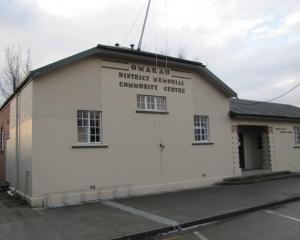Board chairman Richard Smith opened the Ranfurly meeting with grim news: "We've got some horrible figures in there and we've got no reserves to speak of."
Board members were hard pressed to get the rates increase down to the final figure of 14.8%, despite removing from the estimates much of the $90,000 of added depreciation resulting from a revaluation of the assets in July last year.
By the end of the day, a total of almost $182,000 was slashed from the original estimates, which had contained all additional items staff or the board felt needed to be considered for possible inclusion in the rates.
This was a change in practice from previous years when items were put on a wish list and added in as appropriate.
The average district rates bill comprises 85% ward and 15% district expenditure.
Central Otago District Council (CODC) corporate services manager Heather Kinsey told the board she was comfortable with the added depreciation being removed, as the revaluation was done before the October financial crisis and would now probably overstate the value of properties.
Members had concerns about the huge costs ratepayers were facing for the next few years for water and wastewater upgrades.
The cost of the preliminary work installing water meters was $241,000, which the board would have to fund with an external loan.
CODC chief executive John Cooney told the board, in general terms, infrastructure services were required to keep businesses operating and life going on in communities.
"There's very little scope to change [rates for services] and maintain a required level of service. You need to decide what service levels you want to provide."
The board decided to include $80,000 of the requested $241,000 to have some meters installed in 2009-10, and $160,000 for the remaining meters the following year.
By putting part of the cost out a year, the board would save $4000 in depreciation and $8000 in interest.
Board members said the community would struggle to deal with the costs of the water upgrades and asked Mr Cooney to help lobby the Government for assistance.
The Patearoa Recreation Reserve was in deficit, the board heard, and this was forecast to continue at a level of about $20,000 a year for at least the next 10 years.
The board initially decided to rate to clear the deficit but most of that money was later removed and a sum of $3000 was allowed.
Board member Stuart Dunlop wanted the board to take the reserve back and sell the assets as it could not afford to carry the deficit.
The community will be asked to comment on the reserve and its future management.
The reserve includes land and a house bought by the council with the intention of turning it into a camping ground.
Board members will also have discussions with the committee running the reserve.
Numerous items put forward in the estimates were cut or deferred for one, two or three years as members worked to get the rates down to something the community could afford.
Board member Sue Umbers said the average annual wage in Ranfurly according to the last census was $20,000, and ratepayers could not afford a rates increase.
The 14.8% represented an average increase of $300 per ratepayer, she said.
The final result was not what the board wanted, but no other cuts could be made, as most of the increases arose from Government charges and requirements.












